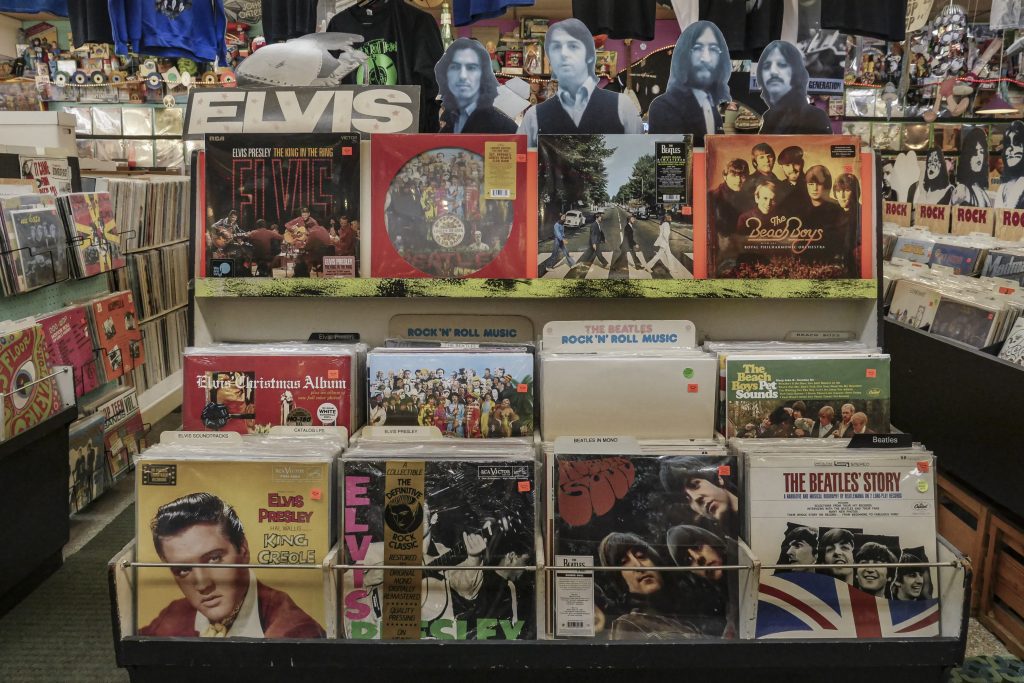When it comes to the world of music, few groups have had the impact and enduring popularity of The Beatles. This legendary band, comprised of four talented musicians, forever changed the landscape of music. But the question on everyone’s mind is, who was the most popular Beatle? In this article, we will explore the various factors that contributed to each band member’s popularity, from their musical contributions to their unique personalities. By understanding the individual qualities that made each Beatle special, we can finally determine who truly stole the hearts of fans around the world. So, get ready to take a trip down memory lane and discover the answer to the age-old question – who was the most popular Beatle? Disclosure: As an Amazon Associate, I earn from qualifying purchases.

Introduction
When it comes to the world of music, few bands have left as profound an impact as The Beatles. Comprised of John Lennon, Paul McCartney, George Harrison, and Ringo Starr, The Beatles revolutionized the music industry and captured the hearts of millions around the world. Each member brought their own unique talents and contributions to the group, making it difficult to pinpoint who was the most popular Beatle. In this article, we will delve into the lives and careers of these iconic musicians, exploring their early beginnings, their successes with The Beatles, their solo ventures, and their lasting legacies.
John Lennon
Early Life and Musical Career
John Lennon, born on October 9, 1940, in Liverpool, England, had a tumultuous childhood marked by his parents’ separation and his mother’s tragic death. Despite these hardships, Lennon discovered his passion for music at a young age and formed his first band, The Quarrymen, before eventually co-founding The Beatles.
The Beatles’ Impact and Popularity
Together with his bandmates, Lennon catapulted The Beatles to global superstardom. Their music was a perfect blend of catchy melodies and heartfelt lyrics that resonated with fans of all ages. They became cultural icons of the 1960s, with their energetic performances and pioneering studio techniques. Beatlemania swept the globe, and their popularity was unparalleled.
Solo Career and Activism
After The Beatles disbanded in 1970, Lennon embarked on a successful solo career, releasing critically acclaimed albums such as “Imagine” and “Double Fantasy.” Alongside his musical endeavors, Lennon was a vocal advocate for peace and political activism. His activism and powerful message struck a chord with fans and solidified his status as not just a musician but also a cultural icon.
Legacy and Influence
Tragically, Lennon’s life was cut short when he was assassinated in 1980. However, his impact on music and culture cannot be overstated. His songwriting prowess, his knack for pushing boundaries, and his unwavering advocacy for peace continue to inspire generations of musicians and fans alike. John Lennon’s legacy as a Beatle and as an individual lives on, cementing his place in music history.
Paul McCartney
Childhood and Early Musical Endeavors
Paul McCartney, born on June 18, 1942, in Liverpool, England, showed a natural talent for music from a young age. Inspired by his father’s interest in jazz and his appreciation for classical music, McCartney learned to play various instruments and eventually met Lennon, forming a musical bond that would change their lives forever.
Success with The Beatles
As the bassist and one of the lead vocalists for The Beatles, McCartney played an integral role in the band’s success. His melodic bass lines and songwriting skills contributed to the band’s distinctive sound. Songs such as “Yesterday,” “Let It Be,” and “Hey Jude” showcased his musical prowess and helped solidify The Beatles’ place in music history.
Post-Beatles Career
Following the breakup of The Beatles, McCartney embarked on a solo career that saw him produce numerous hit songs and critically acclaimed albums. McCartney’s versatility as a musician allowed him to explore various genres, from pop and rock to classical and experimental music. He continued to evolve and push the boundaries of his craft, proving his artistic longevity.
Legacy and Philanthropy
Beyond his musical achievements, McCartney’s philanthropic efforts also set him apart. His involvement in campaigns for animal rights, environmental conservation, and numerous charitable organizations has made a positive impact on the world. McCartney’s legacy extends beyond his musical talents, showcasing his commitment to using his platform for good.
George Harrison
Background and Introduction to Music
George Harrison, born on February 25, 1943, in Liverpool, England, developed a fascination with music from a young age. Inspired by rock and roll pioneers such as Elvis Presley and Carl Perkins, Harrison taught himself to play the guitar and honed his skills as a musician.
Contributions to The Beatles
As the lead guitarist for The Beatles, Harrison brought a unique flair to the band’s sound. His expert guitar playing and incorporation of Indian classical music elements became synonymous with The Beatles’ later works. Songs such as “While My Guitar Gently Weeps” and “Here Comes the Sun” showcased Harrison’s songwriting talent and his ability to captivate audiences.
Solo Career and Influence
Following The Beatles’ breakup, Harrison embarked on a successful solo career, releasing albums that showcased his songwriting prowess and exploration of spiritual themes. His album “All Things Must Pass” remains a classic and showcased his talent as a solo artist. Harrison’s influence extended beyond his own music, as he collaborated with musicians like Eric Clapton and introduced the world to Indian classical music through his association with Ravi Shankar.
Spirituality and Philanthropy
Harrison’s interest in Eastern spirituality and his public endorsement of Hare Krishna teachings added another dimension to his public persona. Throughout his life, he remained committed to philanthropy, supporting various charitable causes. Harrison’s legacy as a musician and activist continues to inspire and resonate with fans around the world.

Ringo Starr
Early Life and Musical Beginnings
Born Richard Starkey on July 7, 1940, in Liverpool, England, Ringo Starr’s foray into music was initially influenced by skiffle and jazz. He began playing the drums as a teenager and joined various bands before eventually joining The Beatles in 1962.
Role in The Beatles
As the drummer for The Beatles, Starr’s steady rhythm and distinctive style provided the backbone for many of their iconic songs. While not as heavily involved in songwriting as Lennon and McCartney, Starr’s contribution to the band’s sound cannot be overlooked. Songs such as “Yellow Submarine” and “With a Little Help from My Friends” showcased his unique vocal abilities and added to the varied tapestry of The Beatles’ music.
Solo Career and Acting
Following the breakup of The Beatles, Starr pursued a solo career that saw him release numerous albums, with hits like “Photograph” and “It Don’t Come Easy.” Additionally, Starr explored acting and appeared in several films, further showcasing his versatility and talent.
Post-Beatles Projects
Starr remained active musically, collaborating with various artists and releasing albums that showcased his talent as a singer-songwriter. He also embarked on successful tours with his All-Starr Band, demonstrating his enduring popularity as a performer. Ringo Starr’s contributions to music, both with The Beatles and as a solo artist, solidify his place in music history.
Success and Achievements
Album Sales
The Beatles’ albums have achieved unparalleled success, with over 800 million copies sold worldwide. Their albums consistently topped the charts and became cultural touchstones, showcasing their enduring popularity.
Chart Success
Throughout their career, The Beatles achieved an impressive number of chart-topping hits in various markets worldwide. From the UK to the US and beyond, their music resonated with audiences and consistently dominated the charts.
Musical Accomplishments
The Beatles’ musical achievements cannot be overstated. Their groundbreaking songwriting, experimentation with studio techniques, and genre-bending music continue to inspire musicians across all genres. They pushed the boundaries of what was possible in popular music and left an indelible mark on the industry.
Impact on Pop Culture
The Beatles’ impact on pop culture extends far beyond their music. Their style, attitudes, and influence on fashion, art, and film continue to be felt decades later. The band’s influence on subsequent generations of musicians and artists is immeasurable.

Popularity and Fan Base
Cultural Influence
The cultural influence of The Beatles cannot be underestimated. Their music transcended boundaries, connecting with fans from different backgrounds, age groups, and cultures. The Beatles’ music gave a voice to a generation and brought people together through their shared love of the band.
Fan Perception
Fans’ perception of The Beatles varied, with each member resonating with different individuals. Personalities, musical styles, and contributions to the band’s sound all played a role in fans’ preferences. However, the overwhelming consensus was that The Beatles as a collective unit captured the hearts of millions, making it difficult to single out one member as the most popular.
International Recognition
The Beatles’ popularity extended far beyond their native United Kingdom. They conquered the American music scene and captivated audiences worldwide. Their impact can be seen in the way they continue to be celebrated and revered in countries across the globe.
Longevity of Popularity
Perhaps one of the most remarkable aspects of The Beatles’ popularity is its longevity. Decades after their heyday, their music remains relevant and continues to attract new generations of fans. The Beatles’ timeless appeal speaks to the enduring quality of their music and the lasting impact they have had on popular culture.
Media and Critical Reception
Media Coverage
The Beatles captured the attention of the media like no other band before them. From their iconic appearances on The Ed Sullivan Show to their controversial interviews and press conferences, the media frenzy surrounding the band was unprecedented. The media played a significant role in amplifying their popularity and shaping public perception of the band.
Critical Analysis
Critics hailed The Beatles as musical innovators, praising their songwriting abilities, vocal harmonies, and their ability to continuously evolve their sound. With each new album, The Beatles challenged conventions and garnered critical acclaim for their artistic growth and experimentation.
Public Sentiment
The public’s sentiment towards The Beatles was overwhelmingly positive. The band’s music resonated with people of all ages, and their charismatic personalities endeared them to millions. The Beatles were seen as symbols of a cultural shift, representing the hopes and dreams of a generation.
Controversies
While The Beatles were adored by the majority, they were not without their fair share of controversies. From their perceived proclamations about being “bigger than Jesus” to their experimentation with drugs and political outspokenness, The Beatles were not immune to criticism. However, these controversies did little to dampen their popularity or overshadow their musical achievements.

Comparisons and Debates
Comparison to Other Band Members
Debates about who was the most popular Beatle have raged on for decades. Each member brought their own unique talents and appeal, making it challenging to rank them definitively. Fans have their own preferences based on musical style, personality, and personal connection to the band’s members.
Global Popularity
The Beatles’ global popularity cannot be understated, with their music resonating with audiences across borders. Their appeal was universal, transcending cultural and language barriers, and cementing their place as one of the most beloved bands in history.
Artistic Contributions
All four members of The Beatles made significant artistic contributions to the band’s sound and success. Each member brought their own talents and strengths, from Lennon’s thought-provoking lyrics to McCartney’s melodic genius, Harrison’s distinctive guitar playing, and Starr’s steady rhythm. It is their collective contributions that made The Beatles the iconic band they are remembered as today.
Public Image
The public image of each member of The Beatles varied. Lennon was seen as the intellectual and outspoken member, McCartney as the charming and versatile musician, Harrison as the spiritual and introspective artist, and Starr as the affable and dependable drummer. Their individual personalities shaped public perception, but it was their combined impact that made The Beatles synonymous with musical greatness.
Disclosure
As an Amazon Associate, I earn from qualifying purchases.

